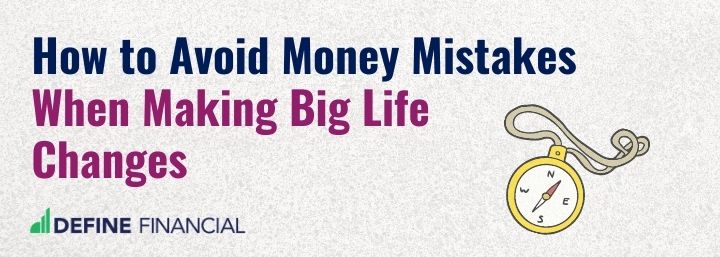
Anytime you consider making a big life change, there’s at least one issue you’ll always have to contend with – money.
Having enough money in-hand can mean the difference between pursuing a life change…or resenting the lost opportunity.
Wouldn’t it be great to be able to switch jobs, move across the country, or launch a new business without worrying about the financial consequences?
We’ll set you up with money habits to make now – so you can always jump at any new adventure that comes your way.
Two Key Money Habits
Are you itching to switch careers? Want to take a year off to travel the world? Are you thinking about launching a new business?
All of these things mean taking on some risk in your life. There may be great potential for rewards when you make big leaps like this, but you’re just as likely to face failures, mistakes, and setbacks, too.
You can mitigate the risk of failure – and make sure it’s not fatal to your ultimate goals – by looking closely at your finances before you make a big move.
Two facets of money management, in particular, really influence how easy (or difficult) your upcoming life change may be for you. These factors are:
- Keeping your ongoing expenses low
- Having a rainy-day fund
Of course, these two things are always helpful in life. Still, keeping your expenses low and having access to a large pile of cash can have an especially great impact when uncertainty and increased risk enter the picture.
Big Life Changes Often Mean Less Income
Why do these two aspects of your personal finances play such a big role in your ultimate success or failure when it comes to a big life change?
Most big life changes can lead to earning a lower amount of money – at least in the short-term. Some changes could even mean the elimination of income entirely.
If you want to change jobs to pursue your dreams, that might mean taking a lower-paying position in a new industry. If you want to launch a business, it could be a while until you’re able to write yourself a paycheck.
And if you want to travel the world, you might need to take a break from working (and earning money), for a few months.
Having small, manageable expenses and enough cash in the bank to pay for them are key determinants of your ability to make a big change in your life when your income drops — even if that drop is temporary or just a part of the journey to making even more income at some point in the future.
Case Study: A Typical American Worker
Let’s use an example to illustrate how high living expenses and low savings can keep you from pursuing the life you want.
Joe is a CPA is an auditor at a Big Four accounting firm. Unfortunately, the long hours and tedious work have made Joe miserable.
The good news for Joe is that he’s earning a fairly sizable paycheck. The bad news is, Joe has some massive ongoing expenses and household bills. While Joe doesn’t spend more than he makes, he and his family are living paycheck-to-paycheck.
Like most Americans, Joe spends way too much of his income at the moment:
- An expensive car loan or lease? Check.
- Huge housing payment? Yup.
- Expensive cable television package? You got it!
- Dining out several times per week? You bet.
- The newest and greatest cell phone? You get the point.
If there is a way to lock in a high monthly payment for a long stretch of time, Joe has jumped on it. Unfortunately, Joe barely knows he’s doing anything wrong.
The Fallacy of “Living Within Your Means”
Common financial wisdom tells us to avoid spending more than we make or “living above our means.” While that’s good advice that will keep us out of debt, it won’t necessarily allow us to rise above our expenses.
Just living at your means keeps you in a position where you can’t build upward or make any big moves.
Without some wiggle room between your income and spending, you can’t save money for the future or make any life changes.
Going back to our example with Joe, you’ll remember he isn’t necessarily living beyond his means. He’s living at his means – just not below them.
Because Joe is spending so much, it’s impossible for him to save any money. Even though he hates his job, he simply can’t afford all those monthly bills without it.
The bottom line: Having high monthly expenditures can prevent you from having the freedom to make big life changes that are important to you.
Unfortunately, Joe may learn this lesson the hard way, or he may never learn it at all.
How Joe’s Life Could Be Different
Now, let’s ask a few questions that could help Joe – and you – find a better balance.
Do you need to have a giant house with an accompanying giant mortgage or rent payment? Not necessarily. You could purchase a modest home or rent a smaller place instead.
Do you need a brand new car every three years? No, you enjoy traveling in style…but a car is a car.
Did you need the newest cell phone every year? Do you need to eat out at restaurants five nights per week? Of course not.
None of Joe’s expenditures are necessary. They’re just nice to have. But you need to ask if “nice to have” is really worth the trade-off. While it’s fun to buy nice things, you’re trading away your flexibility and freedom to make a change when it’s time to do so.
Save Now to Make Your Life Change a Reality
If you’re thinking of taking an adventure or making a big change in life, it may be a good idea to examine your expenses and savings first.
The good news is, once you successfully manage your spending, saving money happens automatically.
If budgeting or tracking your spending sounds boring, you can also just take the easy way out: automate your savings.
It’s not about depriving yourself or cutting out every single cent of discretionary spending. It’s more about making sure you create balance.
With some self-restraint and planning, you can live a lifestyle you enjoy today without eating up every available dollar.


